Art of the Levellers
The Leveller Tracts had some very interesting title pages which used typography and occasionally woodcuts to add graphical force to the political and economic arguments being made by the authors. The pamphlets were published in their thousands during the 1640s and 1650s - the London bookseller George Thomason collected 23,000 of them over a period of twenty years and these comprise a major collection which is held by the British Library.
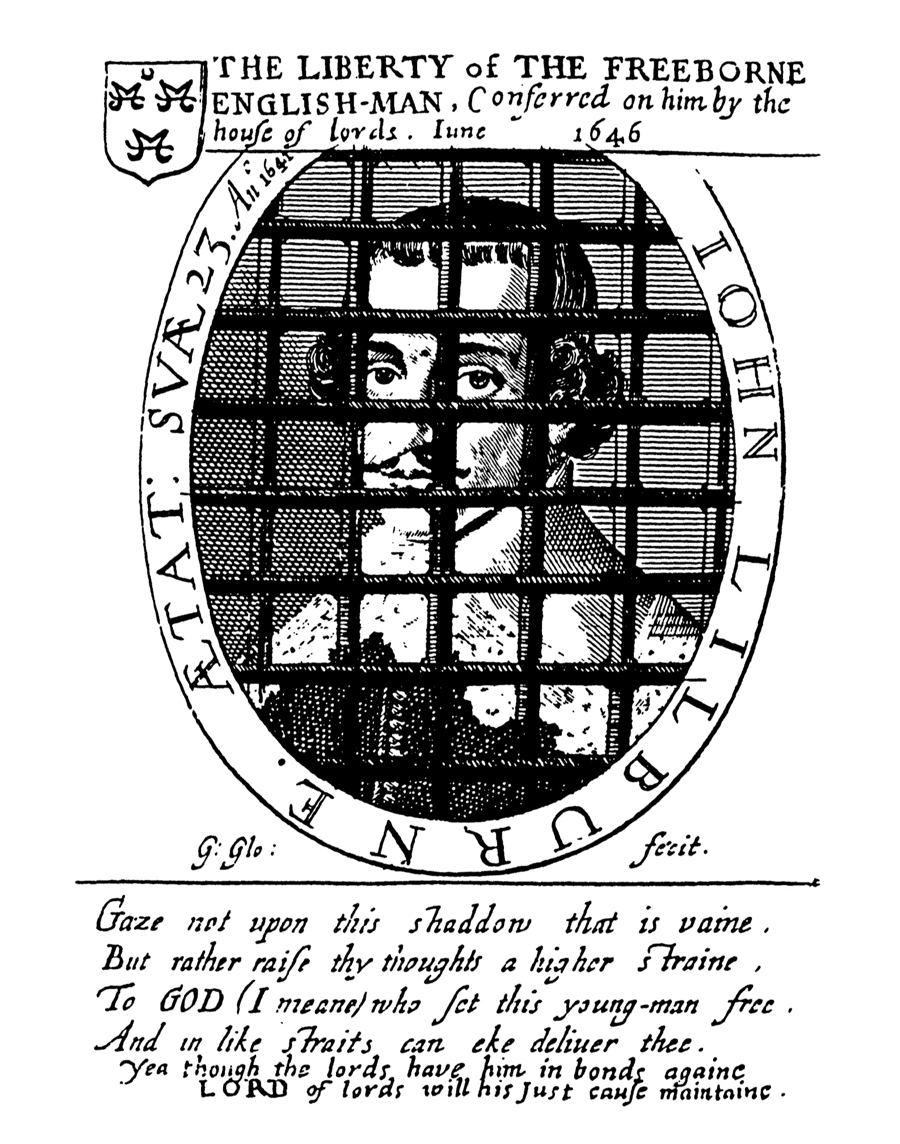
“The Liberty of the Freeborne English-Man, Conferred on him by the house of lords. June 1646.“ The medallion is surrounded by the words "John lilburne. At the age of 23. The Year 1641.” Made by G. Glo.
Beneath is a poem which states:
Gaze not upon this shaddow that is vaine, But rather raise thy thoughts a higher straine, To GOD (I meane) who set this young man free, And in like straits, can eke (also) deliver thee. Yea though the lords have him in bonds againe LORD of lords will his just cause maintaine.
Introduction
The tracts were published by dissidents who did not have much money to publish expensively produced material and so they were printed on cheap paper (which deteriorated quickly and made microfilming later very difficult), using printers who were often sloppy in their typesetting (which only added to the problems for the modern reader of anarchic 17th century spelling and punctuation), and any illustrations they used had to be cheaply done as well. The opponents of the Levellers responded in kind with their own mocking and humorous pamphlets, some of which we also include here.
Now and again a harried printer would add an apology or plea for forgiveness at the end of a pamphlet, such as this one from June 1647:
The Printer to the Reader
I Desire thee to amend with thy pen, one fault escaped in the printing, by negligence, and the Authors absence, which is in the 3. page and 10. line, namely secretaries for sectaries: And if there be any more faults (as none liveth without some) I also desire that thou wilt shew thy patience by thy silence, and that thou may rather make a profitable use of the sence, then anywise strive about words; even as thou wouldest except the like favour of me or any other in thy absence, if thou be one that shewest they selfe thus carefull and zealous for the publicke: especially now in such extreeme need. Farewell. [From William Walwyn’s The poore Wise-mans Admonition (10 June, 1647).]
Or this disclaimer from December 1646:
The Printer to the Reader.
Reader, the shortnesse of time, the absence of the Authour, and the difficulty of the Language in the Charter, not being ordinary Latin, but such as Lawyers use, which is so far above my capacity, that caused me to erre when I used the best skill I could in my Art. Pardon me therefore (I pray thee) and with thy wisdome, learning, and good disposition, help me in this case. And for the faults in the English, the meanest capacity may bee helped thus … [In John Lilburne, The Charters of London: or, The second Part of Londons Liberty in Chaines discovered (18 December 1646).]
Things to Look For in the Images
Some of the common elements to this art include the following:
- the shaping of the text by the typesetters into simple curves (such as bowls) or framing the title page with star or flower-shaped icons.
- the use of bold capitals to give special emphasis to key words such as “Liberty”
- lists of quotes from the Bible to provide moral support for their arguments. In many cases we can see a “battle of the bible quotes” taking place on the front pages of the pamphlets.
- crude but amusing woodcuts to provide images of key characters discussed in the text. Some of the more elaborate images even have footnotes explaining who the figures are.
- the mocking tone of the place and date of publication. Many of these are made up and are deliberately designed to mock and taunt the censors. It should be kept in mind that most of the leading Levellers spent time in prison for repeatedly violating the censorship laws
- the great length of some of the title pages, which in some cases comprised a tract in their own right, or a kind of “executive summary”
- the sheer mass of text they were able to fit on page, such as the broadsheets which overwhelmed the reader with the amount of information. Some of these even had marginalia with additional details.
- the considerable creativity which the authors and printers showed with limited resources and the ever present threat of arrest and the confiscation of their work material by the censors
- the sometimes abusive language used by the more radical Levellers such as John Lilburne and Richard Overton. They were angry for being arrested, not being fairly tried, and being mistreated in jail.
- the use of poems, songs, and mini-plays to make their political points to a popular audience
Further Reading: The Leveller Tracts
- A Summary of the Leveller Tracts Project
- Introduction to the Collection
- Titles Listed by Author
- Combined Table of Contents of the First Edition (by volume and year)
- Combined Table of Contents of the Second Edition (by volume and year)
- Bibliography
- Groups: The Levellers
- Topic: The English Revolution
- Selected Readings on the English Revolution
The Full Collection of Tracts
Corrected volumes in the main part of the OLL (1st edition without images):
Tracts on Liberty by the Levellers and their Critics (1638-1660), 7 vols. Edited by David M. Hart and Ross Kenyon (Indianapolis: Liberty Fund, 2014-16). Online.
Partially corrected volumes in the expanded 2nd edition (draft version with images):
- Combined table of contents
- Vol. 1 (1638-1843)
- Vol. 2 (1644-1645)
- Vol. 3 (1646)
- Vol. 4 (1647)
- Vol. 5 (1648)
- Vol. 6 (1649)
- Vol. 7 (1650-1660)
Examples of the Art of the Levellers
We have selected the following 30 Leveller Tracts because of their interesting title pages:
Key: T.78 (3.18) Richard Overton, An Arrow against all Tyrants and Tyranny (12 October 1646).
Tract number; volume number and location in 1st edition; author; abbreviated title; approximate date of publication according to Thomason.
- T.7 (8.3) Anon., The Lamentable Complaints of Nick Froth the Tapster (May 1641)
- T.18 (1.7) John Goodwin, Anti-Cavalierism (21 October, 1642)
- T.23 (8.12) John Norton, The Miseries of War (17 January, 1643)
- T.24 (8.13) Anon., The Actors Remonstrance (24 January, 1643)
- T.26 (1.9) William Prynne, The Soveraigne Power of Parliaments and Kingdomes (15 April 1643)
- T.32 (8.18) Anon., A Dialogue betwixt a Horse of Warre and a Mill-Horse (2 January, 1644)
- T.40 (8.20) Anon., The Arch-Cheate, or the Cheate of Cheats (4 October, 1644)
- T.44 (2.9) [Richard Overton], The Araignment of Mr. Persecution (8 April 1645)
- T.45 (8.22) Thomas Johnson, A Discourse on Freedome of Trade (11 April, 1645)
- T.52 (2.12) [Richard Overton], The Ordinance for Tythes Dismounted, from all Mosaicall, Evangelicall, and true Magesteriall Right (29 December 1645).
- T.54 (8.26) Richard Overton, Divine Observations upon the London Ministers Letter against Toleration (24 January, 1646).
- T.61 (8.29) Anon., The World is turned Upside Down (8 April, 1646).
- T.68 (3.9) [William Walwyn], A Pearle in a Dounghill (23 June 1646).
- T.70 (3.11) [Richard Overton], A Remonstrance of Many Thousand Citizens, and other Free-born People of England, To their owne House of Commons (17 July 1646).
- T.78 (3.18 and 8.32) Richard Overton, An Arrow against all Tyrants and Tyranny (12 October 1646)
- T.85 (4.1) John Lilburne, Regall Tyrannie discovered: Or, A Discourse, shewing that all lawfull (approbational) instituted power by God amongst men, is by common agreement, and mutual consent (6 January 1647)
- T.86 (9.1) John Taylor, The World turned Upside Down (28 January, 1647)
- T.108 (9.11) Anon., A Remonstrance of the Shee-Citizens of London (21 August, 1647)
- T.121 (9.18) Marchamont Nedham, The Levellers Levelled (3 December, 1647).
- T.130 (9.21) Anon., The Mournfull Cryes of many thousand Poore Tradesmen (22 January, 1848)
- T.132 (5.4) John Lilburne, A Defiance to Tyrants (28 January, 1648)
- T.151 (9.28) [John Lilburne], To the Right Honourable, and supreame Authority of this Nation (11 September, 1648)
- T.156 (5.20) Oliver Cromwell, A New Remonstrance and Declaration from the Army (18 November, 1648)
- T.165 (9.34) Anon., Women Will Have their Will (12 December, 1648)
- T.185 (6.5) [Signed by Robert Ward, Thomas Watfon, Simon Graunt, George Jellis, William Sawyer (or 5 “Beagles”), but attributed to Richard Overton or John Lilburne], The Hunting of the Foxes (21 March 1649)
- T.197 (6.16) John Lilburne, The Legall Fundamentall Liberties of the People of England Revived, Asserted, and Vindicated (8 June 1649)
- T.206 (9.44) Richard Overton, A New Bull-Bayting: or, A Match Play’d at the Town-Bull of Ely (7 August, 1647)
- T.218 (7.2) Mary Stiff, The good Womens Cryes against the Excise of all their Commodities (4 January 1650)
- T.235 (7.17) Anon., The Vindication of Christmas (22 December, 1652)
- T.227 (7.18) Benjamin Worsley, Free Ports (1652)
T.7 (8.3) Anon., The Lamentable Complaints of Nick Froth the Tapster (May 1641).
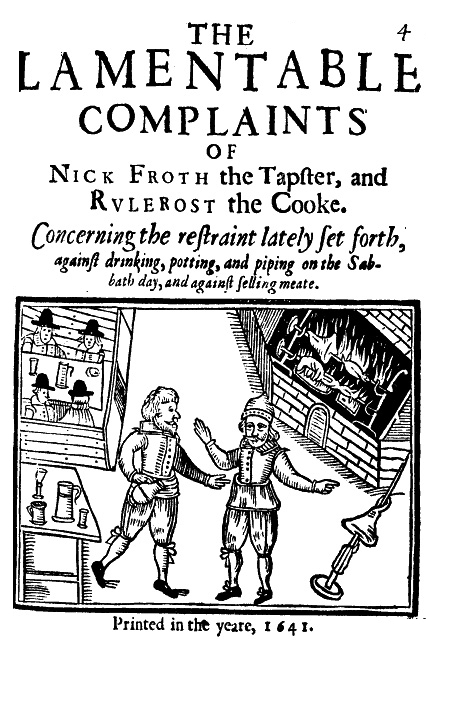
Title
Anon., The Lamentable Complaints of Nick Froth the Tapster, and Rulerost the Cooke. Concerning the restraint lately set forth against drinking, potting and piping on the Sabbath Day, and against selling meate.
Printed in the yeare, 1641.
Comments on the Image
Our first image has a crudely drawn woodcut showing the owners of a tavern complaining about the new regulations which prohibited the sale of drink and food on Sundays (i.e. “Blue Laws”). “Nick Froth”, who serves the beer, and “Rulerost” (or Ruler of the Roast Meats), who cooks and serves the roast meats, are in the center of the picture and customers are seated in booths to the left. Since the Levellers were rediscovered in the late 19th and early 20th centuries by Marxists the free trade and free market aspects of much Leveller thought have been downplayed or completely ignored. We hope to rectify this is our collection.
T.18 (1.7) John Goodwin, Anti-Cavalierism (21 October, 1642).
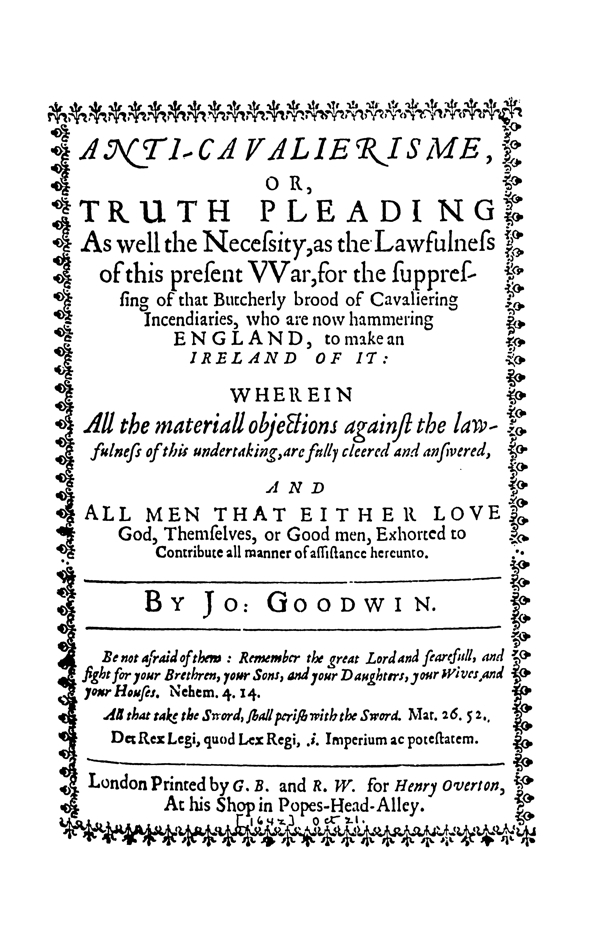
Title
John Goodwin, Anti-Cavalierism, or Truth Pleading As well the Necessity, as the Lawfulness of this present War, for the suppressing of that Butcherly brood of Cavaliering Incendiaries, who are now hammering England, to make an Ireland of it: Wherein All the materiall objections against the lawfulness of this undertaking, are fully cleered and answered, And All Men That Either Love God, Themselves, or Good men, exhorted to Contribute all manner of assistance hereunto. By. Jo. Goodwin.
Be not afraid of them : Remember the great Lord and fearfull, and fight for your Brethren, your Sons, and your Daughters, your Wives, and your Houses. Nehem. 4. 14. All that take the Sword, shall perish with the Sword. Mat. 26.52. De Rex Legi, quod Lex Regi, i. Imperium ac potestatem.
London Printed by G.B. and R.W. for Henry Overton, At his Shop in Popes-Head-Alley.
- vol. 1 1st ed. no image, corrected
- vol. 1 2nd ed. with image, corrected
Comments on the Image
This is the classic form of the Leveller pamphlet with the ornate border of plants (at the top and bottom edge) and other objects (on the right and left edges). It shows the creative powers of the type-setter who is trying to make a piece of plain text look more interesting. We have the tapering of the text at the top and several quotations from the Bible and from Roman authors at the bottom. The Cavaliers were the supporters of the Stuart King Charles I and the pamphlet is justifying the taking up of arms against the King and his supporters.
T.23 (8.12) John Norton, The Miseries of War (17 January, 1643).
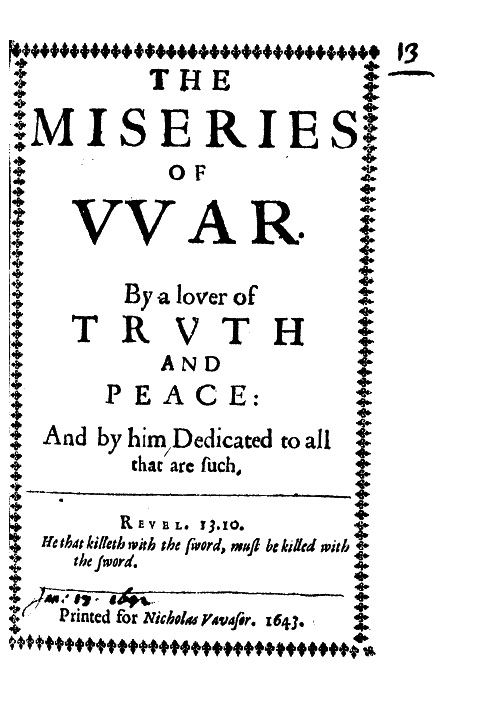
Title
John Norton, THE MISERIES OF VVAR. By a lover of TRVTH AND PEACE: And by him Dedicated to all that are such.
REVEL. 13.10. He that killeth with the sword, must be killed with the sword.
Printed for Nicholas Vavasor. 1643.
Comments on the Image
Again, we have the classic decorative border around the edges. Not all people who opposed the King agreed with taking up arms against him. This pamphlet is a warning to the more radical Levellers that even a just war can result in bringing misery to ordinary people and that he who kills with the sword might end up dying by the sword.
T.24 (8.13) Anon., The Actors Remonstrance (24 January, 1643)
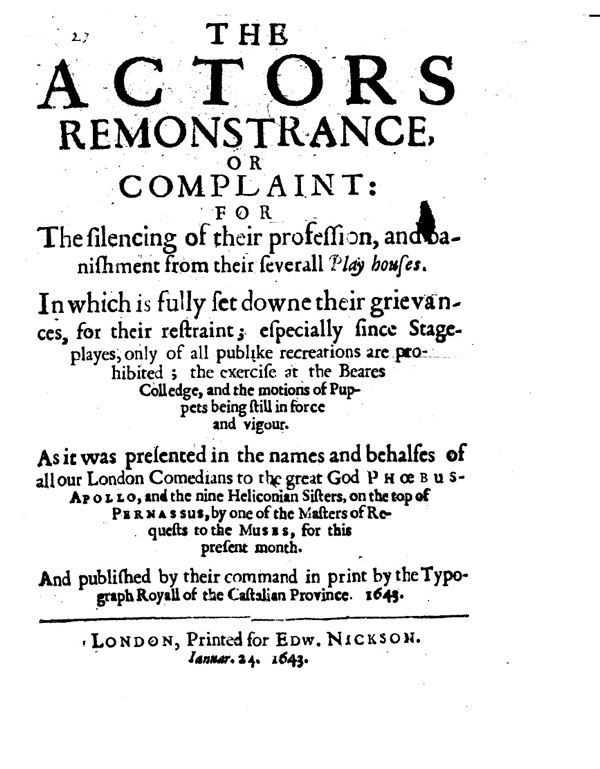
Title
Anon., THE ACTORS REMONSTRANCE, OR COMPLAINT: FOR The silencing of their profession, and banishment from their severall Play houses. In which is fully set downe their grievances, for their restraint; especially since Stage-playes, only of all publike recreations are prohibited; the exercise at the Beares Colledge, and the motions of Puppets being still in force and vigour. As it was presented in the names and behalfes of all our London Comedians to the great God PHOEBUS-APOLLO, and the nine Heliconian Sisters, on the top of PERNASSUS, by one of the Masters of Requests to the MUSES, for this present month. And published by their command in print by the Typograph Royall of the Castalian Province. 1643.
LONDON, Printed for EDW. NICKSON. Ianuar. 24. 1643.
Comments on the Image
The tapering of the middle paragraph looks like the top of a martini glass, although this was not the typesetters intention (of course!). The pamphlet is another protest by ordinary people against government regulation of their business activities, in this case actors in the theaters. They point out the inequality of the law which prohibits their profession but not that of the puppeteers. There is also a sarcastic comment about their pleas for economic liberty being “commanded” by the ancient gods and Muses.
T.26 (1.9) William Prynne, The Soveraigne Power of Parliaments and Kingdomes (15 April 1643)
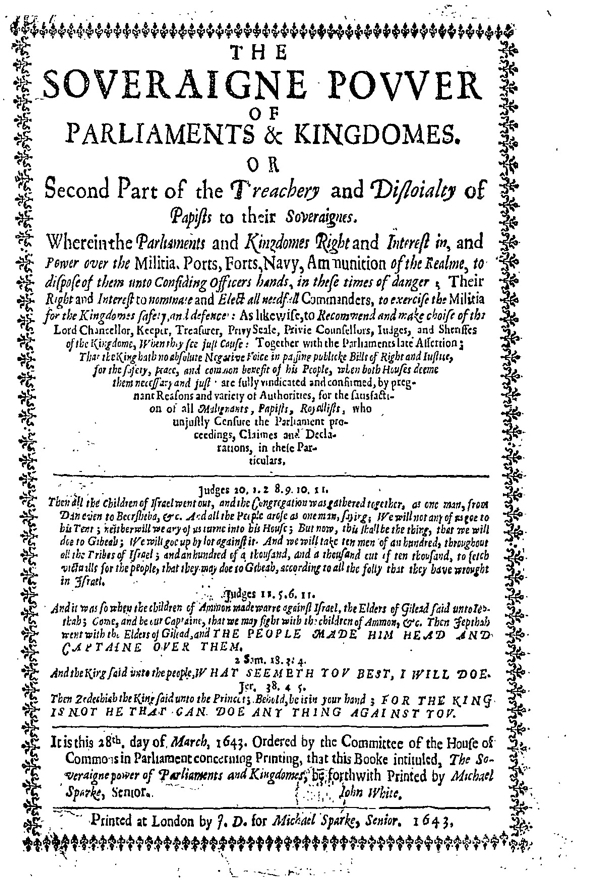
Title
William Prynne, The Soveraigne Power of Parliaments and Kingdomes, Or, Second part of the treachery and Disloyalty of Papists to their Soveraignes. Wherein the Parliaments and Kingdomes Right and Interest in, and Power over the Militia, Ports, Forts, Navy, Ammunition of the realme, to dispose of them unto Confiding Officers hands, in these times of danger. Their Right and Interest to nominate and Elect all needfull Commanders, to exercise the Militia for the Kingdomes safety, and defence: As likewise, to Recommend and make choise of the Lord Chancellor, Keeper, Treasurer, Privy Seale, Privie Counsellors, Judges, and Sheriffes of the Kingdome, When they see just Cause: Together with the Parliaments late Assertion; That the King hath no absolute Negative Voice in passing publicke Bills of Right and Justice, for the safety, peace, and common benefit of his People, when both Houses deeme them necessary and just: are fully vindicated and confirmed,by pregnant Reasons and variety of Authorities, for the satisfaction of all Malignants, Papists, Royalists, who unjustly Censure the parliament proceedings, Claimes and Declarations, in these Particulars.
Judges 20. 1. 2. 8. 9. 10. 11. Then all the children of Israel went out, and the Congregation was gathered together, as one man, from Dan to Bersheeba, etc. And all the People arose as one man, saying, We will not any of us goe to his Tent; neither will we any of us turne into his House; But now, this shall be the thing, that we will doe to Gibeah; We will goe up by lot against it. And we will take ten men of an hundred, throughout all the Tribes of Israel; and an hundred of a thousand, and a thousand out of ten thousand, to fetch victualls for the people, that they may doe to Gibeah, according to all the folly that they have wrought in Israel. Judges 11. 5. 6. 11. And it was so when the children of Ammon made warre against Israel, the Elders of Gilead said unto lepthah; Come, and be our Captaine, that we may fight with the children of Ammon, etc. Then Jepthah went with the Elders of Gilead, and THE PEOPLE MADE HIM HEAD AND CAPTAINE OVER THEM. 2 Sam. 18. 3. 4. And the king said unto the people, WHAT SEEMETH YOU BEST, I WILL DOE. Jer. 38. 4. 5. Then Zedeckiah the Kind said unto the princes; Behold, he is in your hand; FOR THE KING IS NOT HE THAT CAN DOE ANY THING AGAINST YOU.
It is this 28th. day of March, 1643. ordered by the Committee of the House of Commons in Parliament concerning Printing, that this booke intituled, The Soveraigne Power of Parliaments and Kingdomes, be forthwith Printed by Michael Sparke, Senior. Iohn White. Printed at London by J.D. for Michael Sparke, Senior. 1643.
- vol. 1 1st ed. no image, corrected
- vol. 1 2nd ed. with image, corrected
Comments on the Image
William Prynne was a very prolific pamphleteer on the side of the Parliamentarians. His works were very long, with many quotes in Latin, many marginalia and footnotes, and very dense text - all of which must have a been a nightmare for the typesetters and printers. In this title page with have the standard decorative frame, the tapered text in the middle, and several Bible quotes towards the bottom. What is unusual is the statement that the printing of this pamphlet was ordered by a Committee of the House of Commons which was designed to add legitimacy to its publication.
T.32 (8.18) Anon., A Dialogue betwixt a Horse of Warre and a Mill-Horse (2 January, 1644)
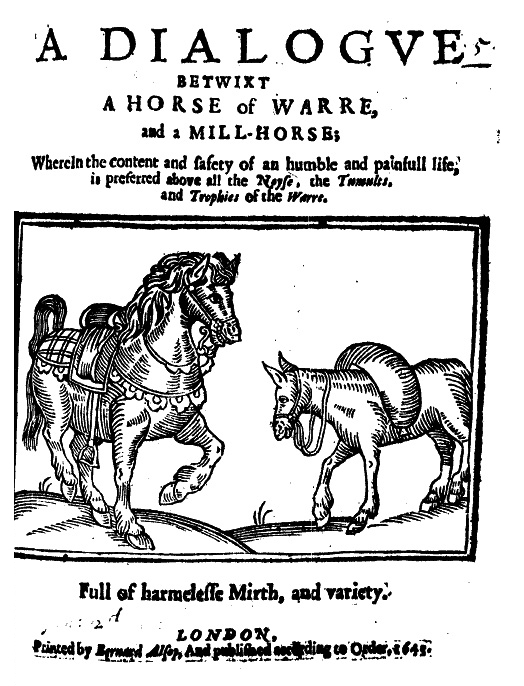
Title
Anon., A Dialogue betwixt a Horse of Warre, and a Mill-Horse; Wherein the content and safety of an humble and painfull life, is preferred above all the Noyse, the Tumults, and Trophies of the Warre. Full of harmelesse Mirth, and variety.
London, Printed by Bernard Alsop, and published according to order, 1643.
Comments on the Image
This is one of the more charming pamphlets in the collection. The title page shows a woodcut of two horses, one a large and aggressive looking “horse of war” (no doubt used by soldiers in both the King’s and the Parliament’s armies), and a smaller work horse which was used to turn a mill wheel to grind flour. In the pamphlet the two horses have a conversation about the merits of the work they have to do and in classic fashion the argument is made that the work of the war horse is destructive of both life and property, while the work of the mill horse is productive economic activity which benefits ordinary people. The typesetter has used a very different font for the dialog of each horse throughout the pamphlet (which actually makes it quite hard to read). Note also the war horse on the left is in a dominant position in the picture (higher and larger, with its head held high) while the work horse on the right is lower with its head slightly bowed.
T.40 (8.20) Anon., The Arch-Cheate, or the Cheate of Cheats (4 October, 1644)
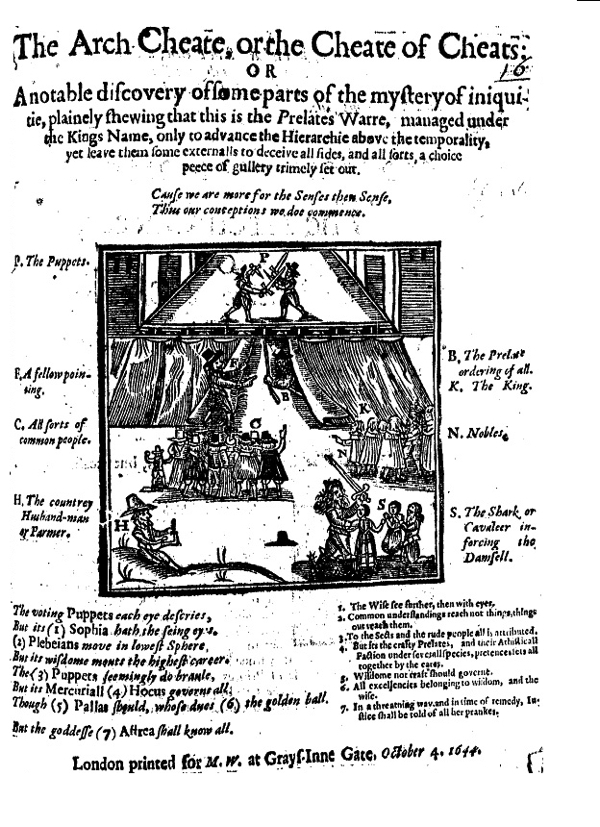
Title
Anon., The Arch-Cheate, or the Cheate of Cheats: OR A notable discovery of some parts of the mystery of iniquitie, plainely shewing that this is the Prelates Warre, managed under the Kings Name, only to advance the Hierarchie above the temporality, yet leave them some externalls to deceive all sides, and all sorts, a choice peece of gullery trimely set out.
Cause we are more for the Senses then Sense. Thus our conceptions we doe commence.
- The Puppets.
- A fellow pointing.
- All sorts of common people.
- The countrey Husband-man or Farmer.
- The Prelate ordering of all.
- The King.
- Nobles.
- The Shark or Cavaleer inforcing the Damsell.
The voting Puppets each eye descries, But its (1)Sophia hath the seing eyes (2) Plebeians move in lowest Sphere, But its wisdome mouts the highest career. The (3) Puppets seemingly do braule, But its Mercuriall (4) Hocus governs all. Though (5) Pallas should, whose dues (6) the golden ball. But the goddesse (7) Astrea shall know all.
The Wise see further, then with eyes. Common understandings reach not things, things out reach them. To the Sects and the rude people all is attributed. But its the crafty Prelates, and their Athisticall Faction under severall species, pretenc [Illegible letters] all together by the cares Wisdome not craft should governe. All excellencies belonging to wisdom, and the wise. In a threatning way, and in time of remedy, Iustice shall be told of all her prankes.
London printed for M. W. at Grays-Inne Gate, October 4. 1644.
Comments on the Image
This is the most complex image in the collection with its detailed drawing, many figures (each of which is labelled with a letter), the cryptic poem, and the footnotes to explain the meaning of it all. We have transcribed the text as best we could. It is an anti-Church pamphlet which argues against the political powers of the Bishops (Prelates). The Levellers were in favour of religious toleration, the end of compulsory tythes paid to the established church, and the use of Church power to punish dissenters and censor opposing views.
T.44 (2.9) [Richard Overton], The Araignment of Mr. Persecution (8 April 1645)
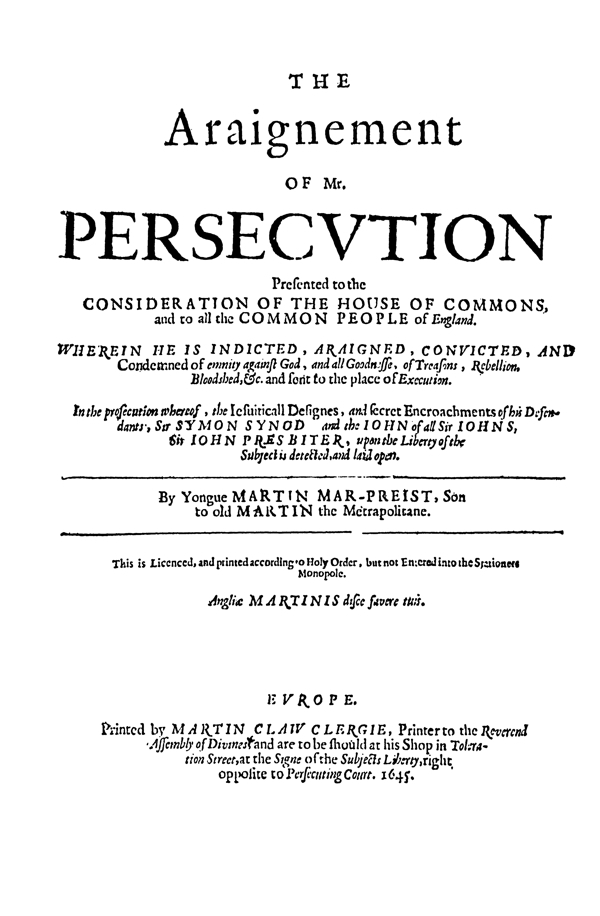
Title
[Richard Overton], The Araignment of Mr. Persecution. Presented to the Consideration of the House of Commons, and to all the Common People of England. Wherein he is Indicted, Araigned, Convicted, and Condemned of enmity against God, and all Goodness, of Treasons, Rebellion, Bloodshed, etc. and sent to the place of Execution, In the prosecution whereof, the Jesuiticall Designes, and secret Encroachments of his Defendants, Sir Symon Synod and the John of all Sir Johns, Sir John Presbiter, upon the Liberty of the Subject is detected and laid open. By Yongue Martin Mar-Priest, Son to old Martin the Metrapolitane.
This is Licenced, and printed according to Holy Order, but not Entered into the Stationers Monopole.
ANGLIAE MARTINIS disce favere tuis.
Europe. Printed by Martin Claw Clergie, Printer to the Reverend Assembly of Divines and are to be should at his Shop in Toleration Street, at the Signe of the Subjects Liberty, right opposite to Persecuting Court. 1645.
- vol. 2 1st ed. no image, corrected
- vol. 2 2nd ed. with image, corrected
Comments on the Image
This is one of the cleverest pamphlets in the collection. It is a mock trial of the personification of religious “Persecution” presided over by Justices of the Peace called “Reason” and “Humanity”, and with a jury made up of people named “Libety-of-Subject”, “Trueth-and-peace”, “Light-of-nature”, and so on. In spite of its mocking tone, it does present the ideas for and against religious toleration quite well. One needs to remember that Overton spent some time in jail and so speaks with some experience about such trials. What is particularly interesting about this title page is the mocking false name of the author (“Younge Martin Mar-Preist” - “mar” meaning scarred or disfigured), the proud assertion that the pamphlet was not submitted to the official Stationer for permission to be published, and the location of the bookseller (“Toleration Street, at the Signe of the Subjects Liberty, right opposite to Persecuting Court”). This was a technique repeatedly used by Overton in his pamphlets which were designed to deliberately provoke the censors.
T.45 (8.22) Thomas Johnson, A Discourse on Freedome of Trade (11 April, 1645)
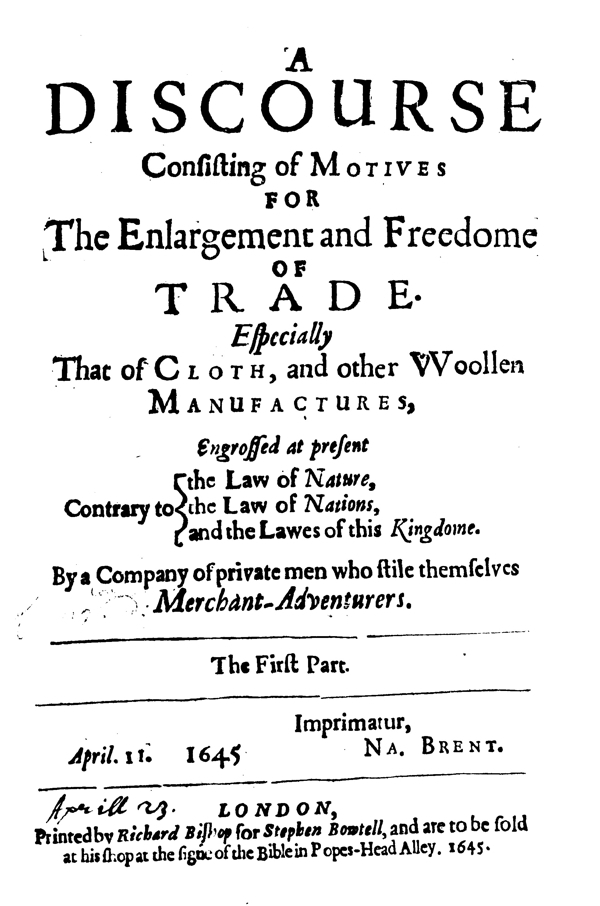
Title
Thomas Johnson, A DISCOURSE Consisting of MOTIVES FOR The Enlargement and Freedome OF TRADE. Especially That of CLOTH, and other Woollen MANUFACTURES, Engrossed at present Contrary to the Law of Nature, the Law of Nations, and the Lawes of this Kingdome. By a Company of private men who stile themselves Merchant-Adventurers. The First Part.
Imprimatur, NA. BRENT. April. 11. 1645
LONDON, Printed by Richard Bishop for Stephen Bowtell, and are to be sold at his shop at the signe of the Bible in Popes-Head Alley. 1645.
Comments on the Image
Traditional histories of the Levellers downplay their commitment to economic liberty based upon general principles rather than narrow self-interest. This title page clearly states what these general principles are, namely the law of nature, the law of nations, and the laws of the Kingdom. Note that “private men” who wrote the pamphlet describe themselves as “merchant-adventurers” or what we today would call entrepreneurs.
T.52 (2.12) [Richard Overton], The Ordinance for Tythes Dismounted, from all Mosaicall, Evangelicall, and true Magesteriall Right (29 December 1645)
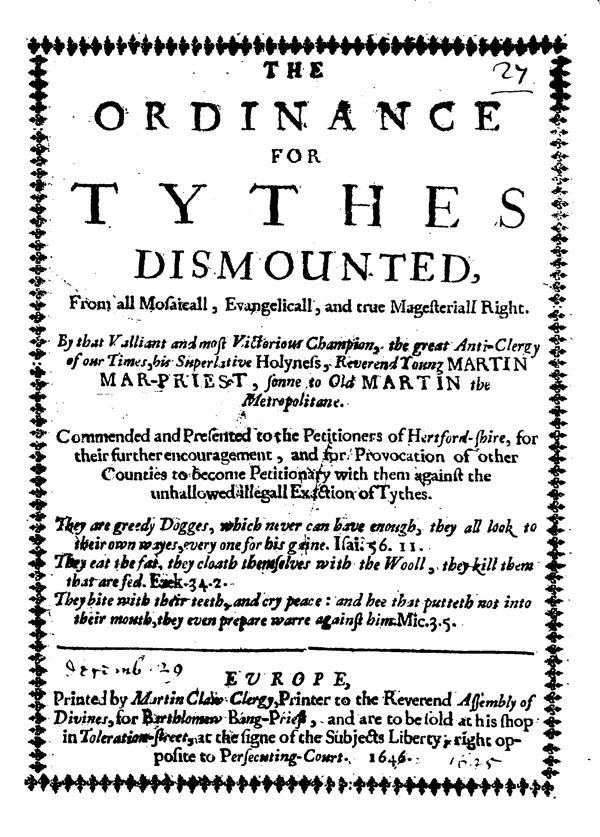
Title
[Richard Overton], The Ordinance for Tythes Dismounted, from all Mosaicall, Evangelicall, and true Magesteriall Right. By this Valliant and most Victorious Champion, the great Anti-Clergy of our Times, via Superlative Holyness, Reverend Young Martin Mar-Priest, sonne to Old Martin the Metropolitane. Commended and Presented to the Petitioners of Hertford-shire, for their further encouragement, and for Provocation of other Counties to become Petitionary with them against the unhallowed illegall Exaction of Tythes.
They are greedy Dogges, which never can have enough, they all look to their own wayes, every one for his gaine. Isai. 56.11. They eat the fat, they cloath themselves with the Wooll, they kill them that are fed. Ezek. 34.2. They bite with their teeth, and cry peace: and hee that putteth not into their mouth, they even prepare warre against him. Mic. 3.5.
Europe, Printed by Martin Claw-Clergy, Printer to the Reverend Assembly of Divines, for Bartholomew Bang-Priest, and are to be sold at his shop in Toleration-street, at the signe of the Subjects Liberty, right opposite to Persecution-Court, 1646.
- vol. 2 1st ed. no image, corrected
- vol. 2 2nd ed. with image, corrected
Comments on the Image
This is another mocking pamphlet by Overton who is speaking as “Martin Mar-Preist” against the compulsory payment of tythes to the Church. We have the classic framed title page and he again uses the false address of a bookshop in “Toleration Street, Europe.” What is unusual are the biblical quotes he has chosen, namely ones describing the violent and plundering behaviour of wild dogs, even the sheep dogs which are supposed to protect the sheep from wolves. The clear implication is that he regards the priesthood as so many “greedy Dogges.”
T.54 (8.26) Richard Overton, Divine Observations upon the London Ministers Letter against Toleration (24 January, 1646)
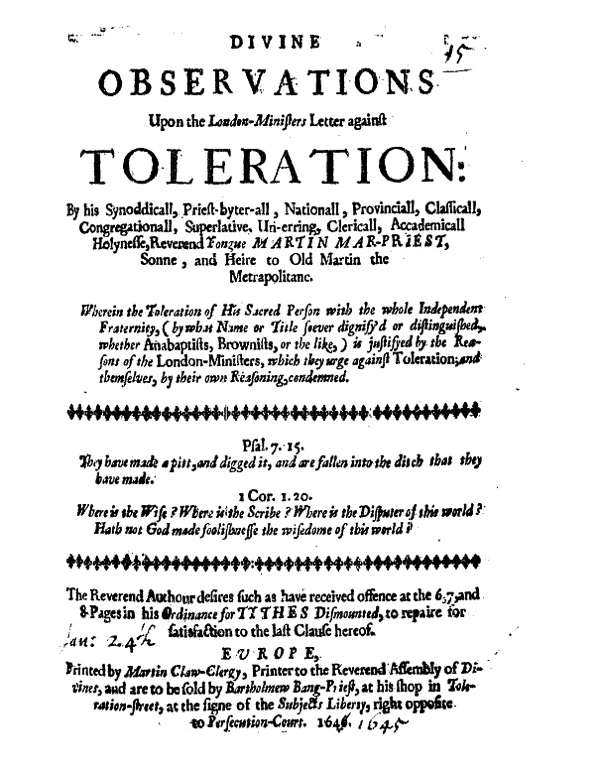
Title
Richard Overton, DIVINE OBSERVATIONS Upon the London-Ministers Letter against TOLERATION: By his Synoddicall, Priest-byter-all, Nationall, Provinciall, Classicall, Congregationall, Superlative, Un-erring, Clericall, Accademicall Holynesse, Reverend Yongue MARTIN MAR-PRIEST, Sonne, and Heire to Old Martin the Metrapolitane. Wherein the Toleration of His Sacred Person with the whole Independent Fraternity, (by what Name or Title soever dignify’d or distinguished, whether Anabaptists, Brownists, or the like,) is justifyed by the Reasons of the London-Ministers, which they urge against Toleration; and themselves, by their own Reasoning, condemned.
Psal. 7. 15. They have made a pitt, and digged it, and are fallen into the ditch that they have made. 1 Cor. 1. 20. Where is the Wise? Where is the Scribe? Where is the Disputer of this world? Hath not God made foolishnesse the wisedome of this world?
The Reverend Authour desires such as have received offence at the 6, 7, and 8. Pages in his Ordinance for TYTHES Dismounted, to repaire for satisfaction to the last Clause hereof.
EUROPE, Printed by Martin Claw-Clergy, Printer to the Reverend Assembly of Divines, and are to be sold by Bartholmew Bang-Priest, at his shop in Toleration-street, at the signe of the Subjects Liberty, right opposite to Persecution-Court. 1646.
Comments on the Image
This another very harshly worded, angry pamphlet by Overton. It uses many of his standard features but with the difference of having horizontal decorations between the paragraphs instead of having a frame which borders the page.
T.61 (8.29) Anon., The World is turned Upside Down (8 April, 1646)
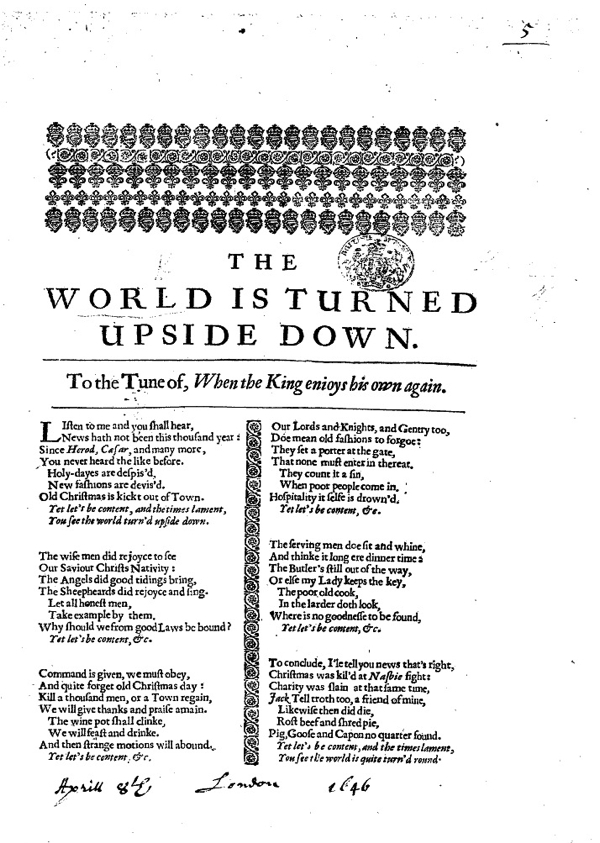
Title
Anon., The world is turned upside down. To the tune of, When the King enjoys his own again.
Comments on the Image
In George Thomason’s catalogue there are many political poems and songs listed in the index. This one is interesting because it suggests the tune to which it is be be sung (“When the King enjoys his own again”) and the decoration at the top and down the middle separating the verses into two columns. It was obviously designed as a sheet which could be taken into a bar or restaurant and used to encourage the patrons to sing it out loud. In the poem/song the author comments on changes of which he does not approve, such as opposition to Christmas by the Puritans, the death and destruction caused by the civil war, restrictions on the movement of poor people, and the loss of what he regards as “good Laws”. His conclusion is that the “world has been turned upside down” which suggest some ambivalence rather than complete support for what was happening. Compare this to the amusing cartoon below on the same thing (4.2. (9.1.) John Taylor, The World turned Upside Down (28 January, 1647)).
Listen to me and you shall hear, News hath not been this thousand year: Since Herod, Caesar, and many more, You never heard the like before. Holy-dayes are despis’d. New fashions are devis’d. Old Christmas is kickt out of Town. Yet let’s be content, and the times lament, You see the world turn’d upside down.
The wise men did rejoyce to see Our Saviour Christs Nativity: The Angels did good tidings bring, The Sheepheards did rejoyce and sing. Let all honest men, Take example by them. Why should we from good Laws be bound? Yet let’s be content, &c.
Command is given, we must obey, And quite forget old Christmas day: Kill a thousand men, or a Town regain, We will give thanks and praise amain. The wine pot shall clinke, We will feast and drinke. And then strange motions will abound, Yet let’s be content, &c.
Our Lords and Knights, and Gentry too, Doe mean old fashions to forgoe: They set a porter at the gate, That none must enter in the rear. They count it a sin, When poor people come in. Hospitality it selfe is drown’d. Yet let’s be content, &c.
The serving men doe sit and whine, And thinke it long ere dinner time: The Butler’s still out of the way, Or else my Lady keeps the key, The poor old cook, In the larder doth look, Where is no goodnesse to be found, Yet let’s be content, &c.
To conclude, I'le tell you news that’s right, Christmas was kil’d at Nasbie fight: Charity was slain at that same time, Jack Tell troth too, a friend of mine, Likewise then did die, Rost beef and shred pie, Pig, Goose and Capon no quarter found. Yet let’s be content, and the times lament, You see the world is quite turn’d round.
T.68 (3.9) [William Walwyn], A Pearle in a Dounghill (23 June 1646)
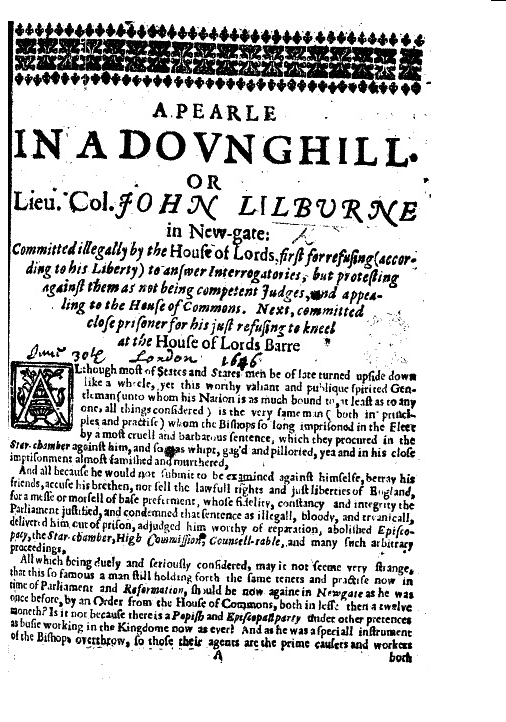
Title
[William Walwyn], A Pearle in a Dounghill. Or Lieu. John Lilburne in New-gate: Committed illegally by the House of Lords, first for refusing (according to his Liberty) to answer Interrogatories, but protesting against them as not being competent Judges, and appealing to the House of Commons. Next committed close prisoner for his just refusing to kneel at the House of Lords Barre.
- vol. 3 1st ed. no image, corrected
- vol. 3 2nd ed. with image, corrected
Comments on the Image
This is a pamphlet written in support of John Lilburne who was again in prison for his political activities. There are two things to note: the elaborate design at the top of the page and the extravagant claim behind the heading in bold type. “A Pearl in a Dounghill” clearly suggest that people like Lilburne are like pearls which have been cast by the House of Lords into a legal and prison system which is no better than a dung hill.
T.70 (3.11) [Richard Overton], A Remonstrance of Many Thousand Citizens, and other Free-born People of England, To their owne House of Commons (17 July 1646)
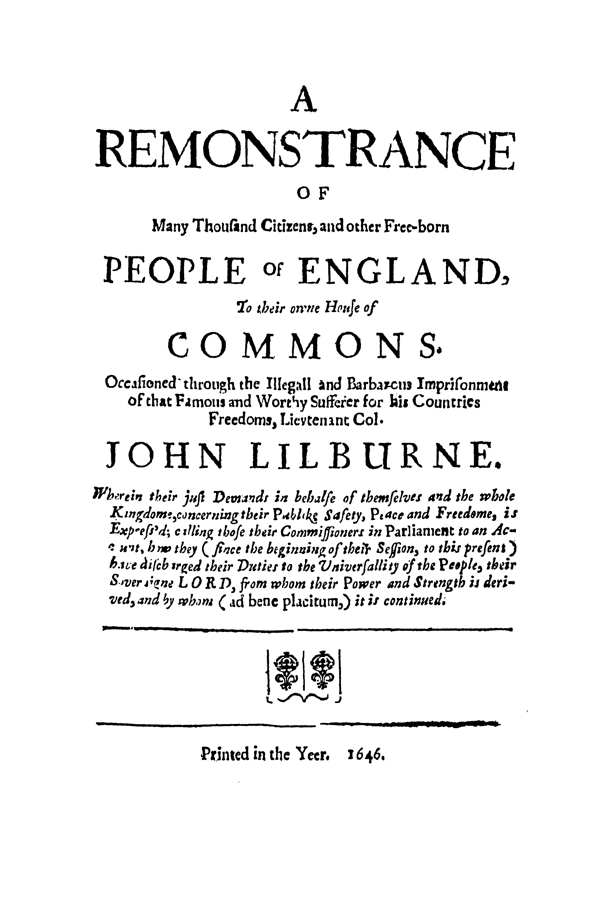
Title
[Richard Overton], A Remonstrance of Many Thousand Citizens, and other Free-born People of England, To their owne House of Commons. Occasioned through the Illegall and barbarous Imprisonment of that Famous and Worthy Sufferer for his Countries Freedoms, Lieutenant Col. John Lilburne. Wherein their just Demands in behalfe of themselves and the whole Kingdome, concerning their Publick Safety, Peace and Freedome, is Express’d; calling thoise their Commissioners in Parliament to an Account, how they (since the beginning of their Session, to this present) have discharged their Duties to the Universallity of the People, their Sovereign Lord, from whom their Power and Strength is derived, and by whom (ad bene placitum) it is continued.
Printed in the Yeer. 1646.
- vol. 3 1st ed. no image, corrected
- vol. 3 2nd ed. with image, corrected
This pamphlet contains the classic depiction of Richard Overton behind bars which we also used at the head of this page:

Comments on the Image
What is interesting about this pamphlet is not its title page (which is relatively simple for a Leveller pamphlet with only a modest decoration above the year it was published) but the image inside which was “photoshopped” (to use an anachronism) to show Lilburne behind bars. This was made to honour one of the Leveller leaders and we have adopted it as one of the main images we use in our collection. Lilburne appears to be looking out of his prison through the bars but it is in fact meant to look like a medallion given to him by the House of Lords. There is a fake coat of arms at the top left and a banner which mockingly says “The Liberty of the Freeborne English-Man, Conferred on him by the house of lords. June 1646.” The medallion is surrounded by the words “John lilburne. At the age of 23. The Year 1641.” Beneath is a poem which states:
Gaze not upon this shaddow that is vaine, But rather raise thy thoughts a higher straine, To GOD (I meane) who set this young man free, And in like straits, can eke (also) deliver thee. Yea though the lords have him in bonds againe LORD of lords will his just cause maintaine.
T.78 (3.18 and 8.32) Richard Overton, An Arrow against all Tyrants and Tyranny (12 October 1646)
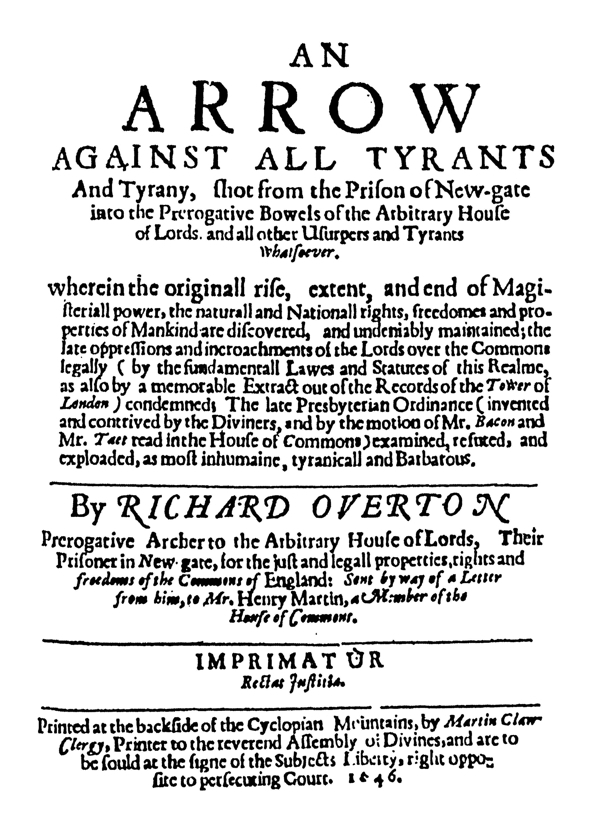
Title
Richard Overton, AN ARROW AGAINST ALL TYRANTS And Tyrany, shot from the Prison of New-gate into the Prerogative Bowels of the Arbitrary House of Lords· and all other Usurpers and Tyrants Whatsoever. Wherein the originall rise, extent, and end of Magisteriall power, the naturall and Nationall rights, freedomes and properties of Mankind are discovered, and undeniably maintained; the late oppressions and incroachments of the Lords over the Commons legally (by the fundamentall Lawes and Statutes of this Realme, as also by a memorable Extract out of the Records of the Tower of London) condemned; The late Presbyterian Ordinance (invented and contrived by the Divaners, and by the motion of Mr. Bacon and Mr. Taet read in the House of Commons) examined, refuted, and exploaded, as most inhumaine, tyranicall and Barbarous. By RICHARD OVERTON Prerogative Archer to the Arbitrary House of Lords, Their Prisoner in New gate, for the just and legall properties, rights and freedoms of the Commons of England: Sent by way of a Letter from him, to Mr. Henry Martin, a Member of the House of Commons. IMPRIMATUR Rectat Justitia.
Printed at the backside of the Cyclopian Mountains, by Martin Claw-Clergy, Printer to the reverend Assembly of Divines, and are to be sould at the signe of the Subjects Liberty, right opposite to persecuting Court. 1646.
- vol. 3 1st ed. no image, corrected, with modernized spelling
- vol. 3 2nd ed. with image, corrected, original spelling
Comments on the Image
This is one of Overton’s most hard-hitting and radical pamphlets in favour of the natural right to individual liberty and opposition to political tyranny. The title page is in the shape of the ideological arrow he was firing at Parliament with a tapered top and a cylindrical column of text in the middle, and then perhaps a fletching at the bottom. Overton pulls no punches in stating his intention to oppose “all tyrants and tyrany” and that he does so as the “prerogative Archer to the Arbitrary House of Lords”, as if he were some 17th century Robin Hood. Note also the “imprimatur” (by the rule of justice) and place of publication at the bottom: “the backside of the Cyclopian Mountains, by Martin Claw-Clergy, Printer to the reverend Assembly of Divines, and are to be sould at the signe of the Subjects Liberty, right opposite to persecuting Court.”
T.85 (4.1) John Lilburne, Regall Tyrannie discovered: Or, A Discourse, shewing that all lawfull (approbational) instituted power by God amongst men, is by common agreement, and mutual consent (6 January 1647)
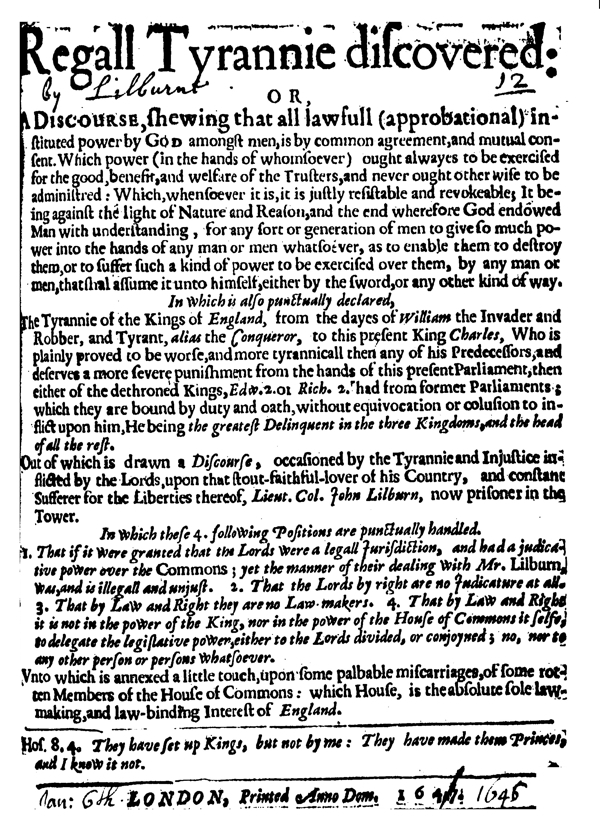
Title
John Lilburne, Regall Tyrannie discovered: Or, A Discourse, shewing that all lawfull (approbational) instituted power by God amongst men, is by common agreement, and mutual consent. Which power (in the hands of whomsoever) ought alwayes to be exercised for the good, benefit, and welfare of the Trusters, and never ought other wise to be administered: Which, whensoever it is, it is justly resistable and revokeable; It being against the light of Nature and reason, and the end wherefore God endowed Man with understanding, for any sort or generation of men to give so much power into the hands of any man or men whatsoever, as to enable them to destroy them, or to suffer such a kind of power to be excercised over them, by any man or men, that shal assume it unto himself, either by the sword, or any other kind of way. In which is also punctually declared, The Tyrannie of the Kings of England, from the dayes of William the Invader and Robber, and Tyrant, alias the Conqueror, to this present King Charles, Who is plainly proved to be worse, and more tyrannicall then any of his Predecessors, and deserves a more severe punishment from the hands of this present Parliament, then either of the dethroned Kings, Edw. 2. or Rich. 2. had from former Parliaments; which they are bound by duty and oath, without equivocation or colusion to inflict upon him, He being the greatest Delinquent in the three Kingdoms, and the head of all the rest. Out of which is drawn a Discourse, occasioned by the Tyrannie and Injustice inflicted by the Lords, upon that stout-faithful-lover of his Country, and constant Sufferer for the Liberties thereof, Lieut. Col. John Lilburn, now prisoner in the Tower.
In which these 4. following Positions are punctually handled. 1. That if it were granted that the Lords were a legall jurisdiction, and had a judicative power over the Commons; yet the manner of their dealing with Mr. Lilburn, was, and is illegall and unjust. 2. That the Lords by right are no Judicature at all. 3. That by Law and Right they are no Law makers. 4. That by Law and Right it is not in the power of the king, nor in the power of the House of Commons it selfe, to delegate the legislative power, either to the Lords divided, or conjoyned; no, nor to any other person or persons whatever. Vnto which is annexed a little touch, upon some palbable miscarriages, of some rotten Members of the House of Commons: which House, is the absolute sole lawmaking, and law-binding Interest of England.
Hos. 8.4. They have set up Kings, but not by me: They have made them Princes, and I know it not.
London, Printed Anno Dom. 1647.
- vol. 4 1st ed. no image, corrected
- vol. 4 2nd ed. with image, corrected
Comments on the Image
This looks like the beginning of a essay but it is actually the title page of a much longer work. There is nothing of note either artistically or design originality about this but it is in fact a 17th century example of what today is called an “executive summary” where Lilburne provides the gist of his entire argument within the confines of one page. It is noteworthy for the radical nature of the single biblical quote he has at the very bottom: “They have set up Kings, but not by me”, which suggests he is arguing for popular participation in the selection of one’s rulers.
T.86 (9.1) John Taylor, The World turned Upside Down (28 January, 1647)
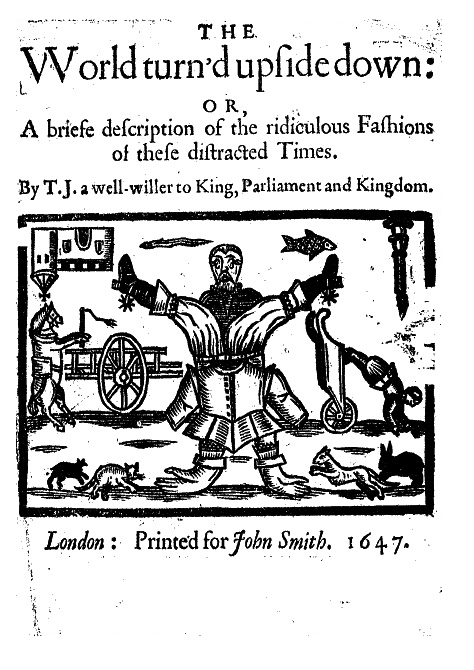
Title
John Taylor, The World turned upside down: OR, A briefe description of the ridiculous Fashions of these distracted Times. By T. I. a well-willer to King, Parliament and Kingdom.
London: Printed for Iohn Smith. 1647.
Comments on the Image
This is a very amusing cartoon which picks up a theme which is mentioned above in “3.8. (8.31.) Anon., The World is turned Upside Down (8 April, 1646).” For some people the civil wars, revolution, and then execution of King Charles, turned the world up-side down. Here we have a depiction of what an “up-side down world” might look like. There are churches in the sky, fish flying in the sky, rabbits and rats chasing cats, a man pushed by a wheel barrow and a cart by a horse. In the center there is a man standing on his hands, waving his legs like hands, and his head coming out of his groin. This is the physical equivalent of what the Leveller movement wanted to do politically to England.
T.108 (9.11) Anon., A Remonstrance of the Shee-Citizens of London (21 August, 1647)
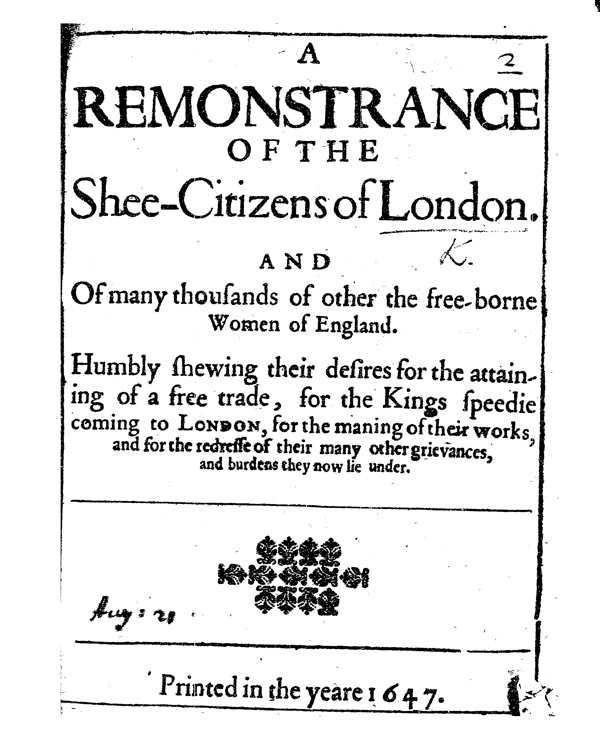
Title
Anon., A Remonstrance of the Shee-Citizens of London. And of many thousands of other the free-borne Women of England. Humbly shewing their desires for the attaining of a free trade, for the Kings speedie coming to London, for the maning of their works, and for the redresse of their many other grievances, and burdens they now lie under.
Printed in the yeare 1647.
Comments on the Image
This pamphlet is not very interesting graphically but it one of the few pamphlets written by and about women, or what the anonymous author calls “shee-citizens” which might well be a neologism of the period. It is also noteworthy because of the prominence it gives to the need for “free trade” for the “many thousands of other free-borne Women of England.” This was in their minds as important for the interests of working women as it was for men.
T.121 (9.18) Marchamont Nedham, The Levellers Levelled (3 December, 1647)
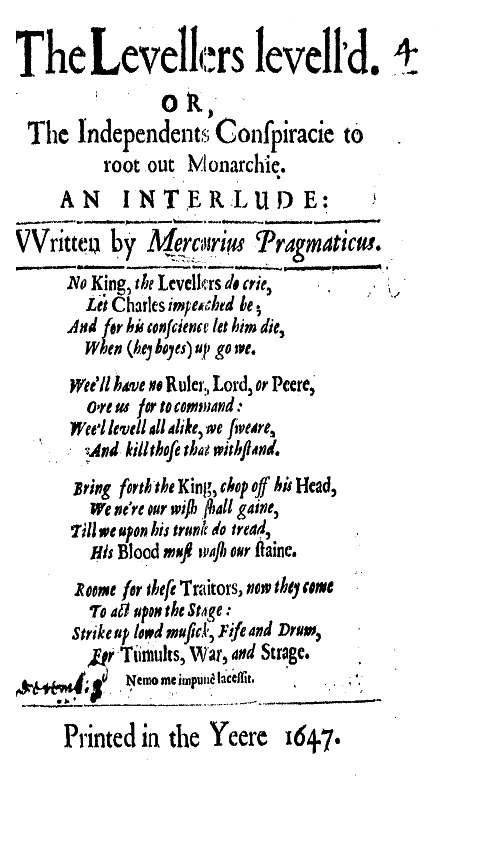
Title
Marchamont Nedham, The Levellers levell’d. Or the Independents Conspiracy to root out Monarchie . An interlude. Written by Mercurius Pragmaticus.
Printed in the Yeere 1647.
Comments on the Image
Marchamont Nedham was not a Leveller. This pamphlet is interesting because of his clever pun on the name “Leveller” in the title and the poem which accompanies it. The pamphlet is in the form of a play or dialog which attacks the anti-monarchist Levellers or “agitators” who are named “Apostasie”, “Conspiracie,” “Treacherie,” “Democracie,” and “Impietie.” Their views are opposed by a character called “Englands Genius.” An anti-Leveller poem on the title page opens the play:
No King, the Levellers do crie, Let Charles impeached be; And for his conscience let him die, When (hey boyes) up go we.
Wee’ll have no Ruler, Lord, or Peere, O’re us for to command: Wee'l levell all alike, we sweare, And kill those that withstand.
Bring forth the King, chop off his Head, We ne’re our wish shall gaine, Till we upon his trunk do tread, His Blood must wash our staine.
Roome for these Traitors, now they come To act upon the Stage: Strike up lowd musick, Fife and Drum, For Tumults, War, and Strage.
T.130 (9.21) Anon., The Mournfull Cryes of many thousand Poore Tradesmen (22 January, 1848)
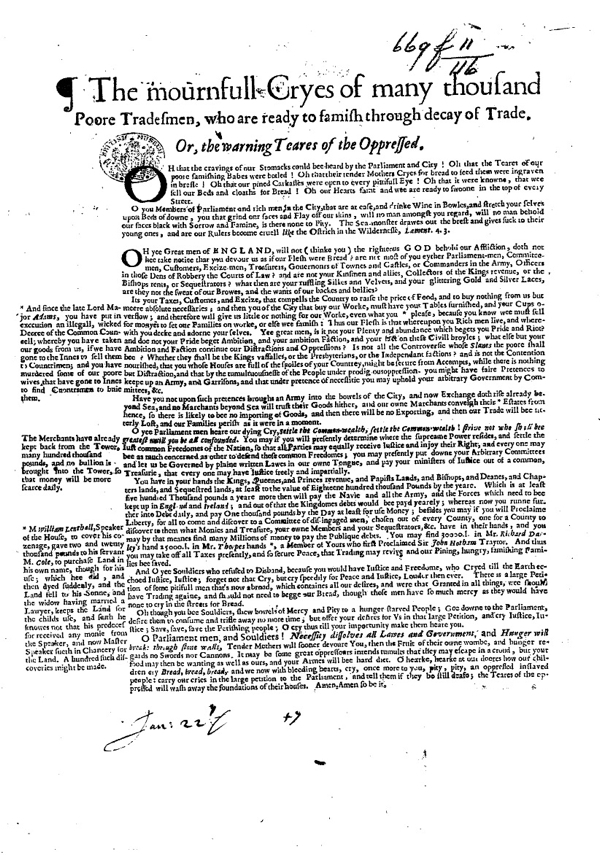
Title
Anon., The Mournfull Cryes of many thousand Poore Tradesmen, who are ready to famish through decay of Trade. Or, the warning Teares of the Oppressed.
Comments on the Image
This is an example of a broadside, a large format single page which was designed to be posted on a wall or door and read my passers by. It is interesting because it takes the side of the “poor tradesmen” who are harmed by the decline in trade caused by war and political uncertainty. It is also interesting because it has three large “side notes” or marginalia which makes one think about for whom this pamphlet was intended.
T.132 (5.4) John Lilburne, A Defiance to Tyrants (28 January, 1648)
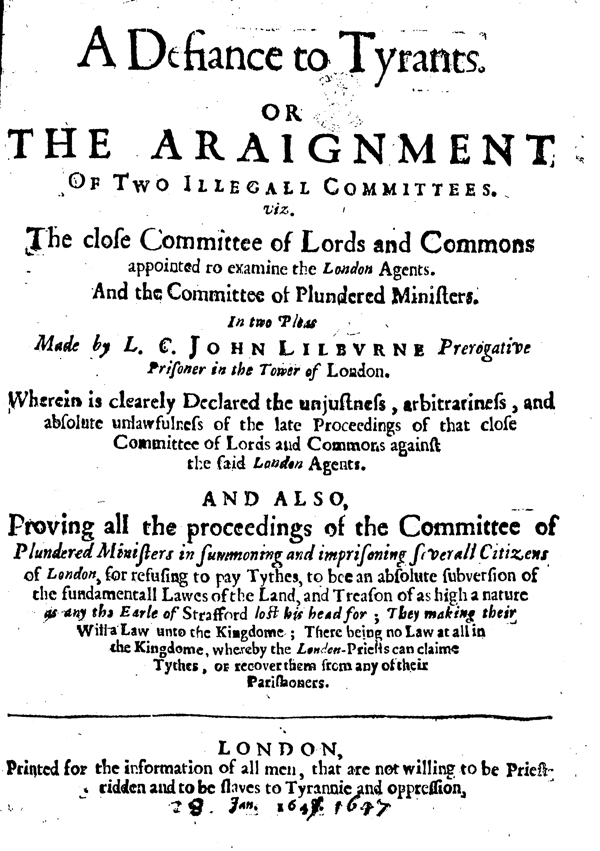
Title
John Lilburne, A Defiance to Tyrants. Or The Araignment of Two Illegall Committees. viz. The close Committee of Lords and Commons appointed to examine the London Agents. And the Committee of Plundered Ministers. In two Pleas made by L.C. Lilburne Prerogative Prisoner in the the Tower of London. Wherein is clearely Declared the unjustness, arbitrariness, and absolute unlawfulness of the late proceedings of that close Committee of Lords and Commons against the London Agents. And also, Proving all the proceedings of the Committee of Plundered Ministers in summoning and imprisoning severall Citizens of London, for refusing to pay Tythes, to bee an absolute subversion of the fundamentall Lawes of the Land, and Treason of as high a nature as any the Earle of Strafford lost his head for; They making their Will a Law unto the Kingdome; There being no Law at all in the Kingdome, whereby the London-Priests can claime Tythes, or recover them from any of their Parishoners.
London, Printed for the information of all men, that are not willing to be Priest-ridden and to the slaves to Tyrannie and oppression.
Comments on the Image
This is a standard Leveller pamphlet which has a particularly well-shaped bowl design for the text at the bottom. It also has a very provocative publishing statement which states that it was printed for those who are “not willing to be Priest-ridden and to the slaves to Tyrannie and oppression.”
T.151 (9.28) [John Lilburne], To the Right Honourable, and supreame Authority of this Nation (11 September, 1648)
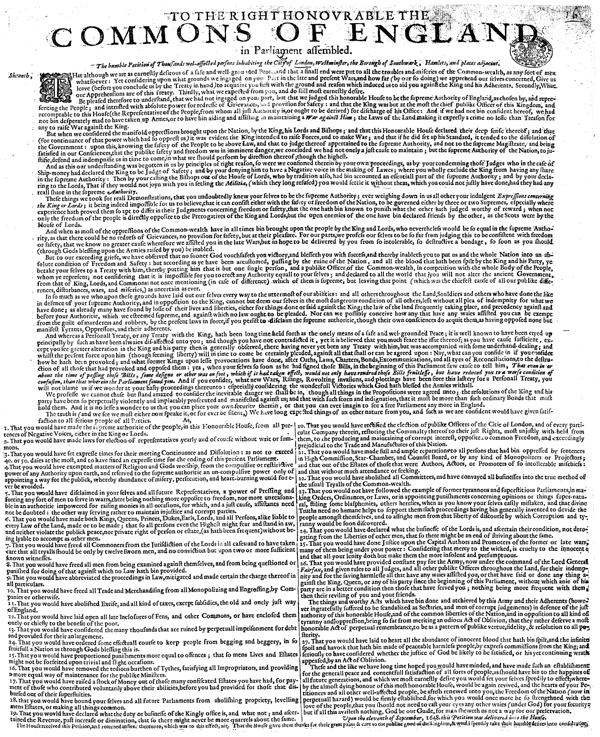
Title
[Anon. but sometimes attributed to Walwyn, Overton, or Lilburne], [The Petition of 11 September 1648], To the Right Honourable, the Commons of England In Parliament Assembled. The humble Petition of divers wel affected Persons inhabiting the City of London, Westminster, the Borough of Southwark, Hamblets, and places adjacent.
Comments on the Image
This is one of the most important of the “Petitions” submitted to the government outlining the demands of the Levellers and their supporters. It is a broadside designed to be posted on walls or doors and read in public. It is interesting for the detailed listing of their demands which requires two columns of small print on the bottom in order to fit on one page.
5.30. (5.20.) Oliver Cromwell, A New Remonstrance and Declaration from the Army (18 November, 1648)
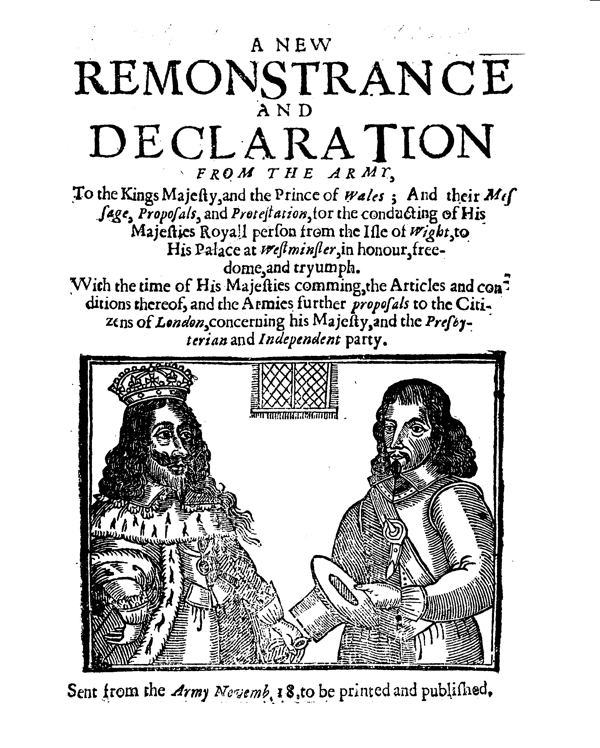
Title
Oliver Cromwell, A New Remonstrance and Declaration from the Army, to the Kings Majesty, and the Prince of Wales; and their Message, Proposals, and Protestation, for the conducting of His Majesties Royall person from the Isle of Wight, to His Palace at Westminster, in honour, freedome, and tryumph. With the time of His Majesties comming, the Articles and conditions thereof, and the Armies further proposals to the Citizens of London, concerning his Majesty, and the Presbyterian and Independent party. Sent from the Army Novemb. 18. to be printed and published.
Comments on the Image
There were several political factions within the army. The Levellers were a very vocal group within the New Model Army and dominated some of the meetings that were held to sound out the opinions of the soldiers. Middle ranking officers who were staunch Levellers would then present the conclusions of these discussions to the senior officers. This pamphlet reflects the interests of a less politically radical group around Cromwell who wanted to negotiate with the King. Here we see a woodcut showing an officer taking off his hat as he addresses the King. Compare this with the anti-monarchical sentiments of Lilburne or Overton. They got into trouble for not taking off their hats or kneeling before the bar in the House of Lords.
T.165 (9.34) Anon., Women Will Have their Will (12 December, 1648)
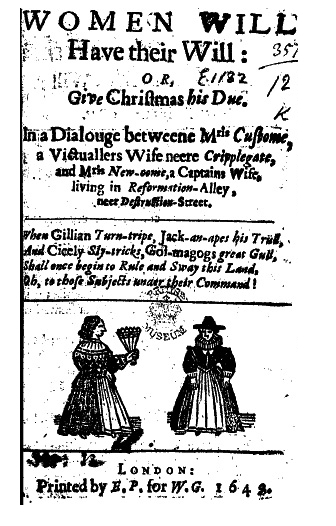
Title
Anon., Women Will Have their Will: OR, Give Christmas his Due. In a Dialouge betweene Mris Custome, a Victuallers Wife neere Cripplegate, and Mris New-come, a Captains Wife, living in Reformation-Alley, neer Destruction-Street.
When Gillian Turn-tripe, Jack-an-apes his Trüll, And Cicely Sly-tricks, Gol-magogs great Gull, Shall once begin to Rule and Sway this Land, Oh, to those Subjects under their Command!
LONDON: Printed by E. P. for W. G. 1648.
Comments on the Image
This pamphlet is another little play with two characters with speaking parts: Mistress Custome who is the wife of a “victualler” (a food supplier) and Mistress New-come who is an officer’s wife. Again we see a woodcut with a working woman defending the right of the ordinary people to celebrate Christmas against the wishes of the authoritarian Puritans who wanted to ban it.
T.185 (6.5) [Signed by Robert Ward, Thomas Watfon, Simon Graunt, George Jellis, William Sawyer (or 5 “Beagles”), but attributed to Richard Overton or John Lilburne], The Hunting of the Foxes (21 March 1649)
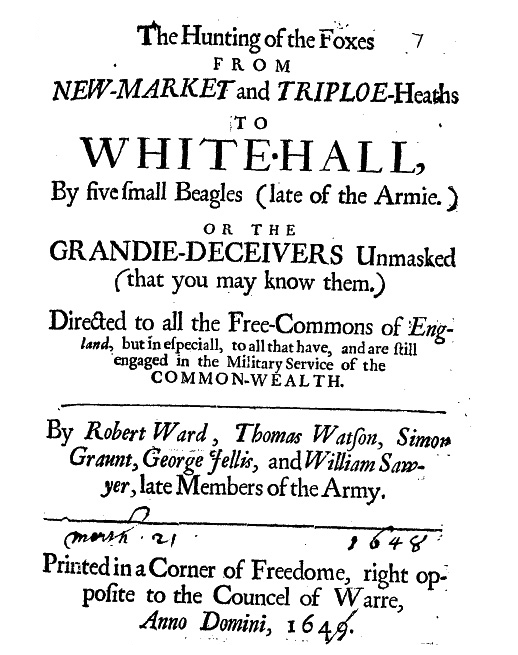
Title
[Signed by Robert Ward, Thomas Watfon, Simon Graunt, George Jellis, William Sawyer (or 5 “Beagles”), but attributed to Richard Overton or John Lilburne], The Hunting of the Foxes from New-Market and Triploe-Heaths to White-Hall, by five small Beagles (late of the Armie.) Or The Drandie-Deceivers Unmasked (that you may know them.) Directed to all the Free-Commons of England, but in especiall, to all that have, and are still engaged in the Military Service of the Common-Wealth. By Robert Ward, Thomas Watson, Simon Graunt, George Jellis, and William Sawyer, late Members of the Army.
Printed in a Corner of Freedome, right opposite to the Councel of Warre, Anno Domini, 1649.
- vol. 6 1st ed. no image, corrected
- vol. 6 2nd ed. with image, corrected
Comments on the Image
The “five small Beagles” were ordinary soldiers who supported Leveller ideas but who felt that Cromwell and other officers had sold out the interests of the soldiers for their own personal benefit. They were the “Foxes” which the Beagles had hunted down all the way to London (Whitehall). Note the place of publication: “Printed in a Corner of Freedome, right opposite to the Councel of Warre.”
T.197 (6.16) John Lilburne, The Legall Fundamentall Liberties of the People of England Revived, Asserted, and Vindicated (8 June 1649)
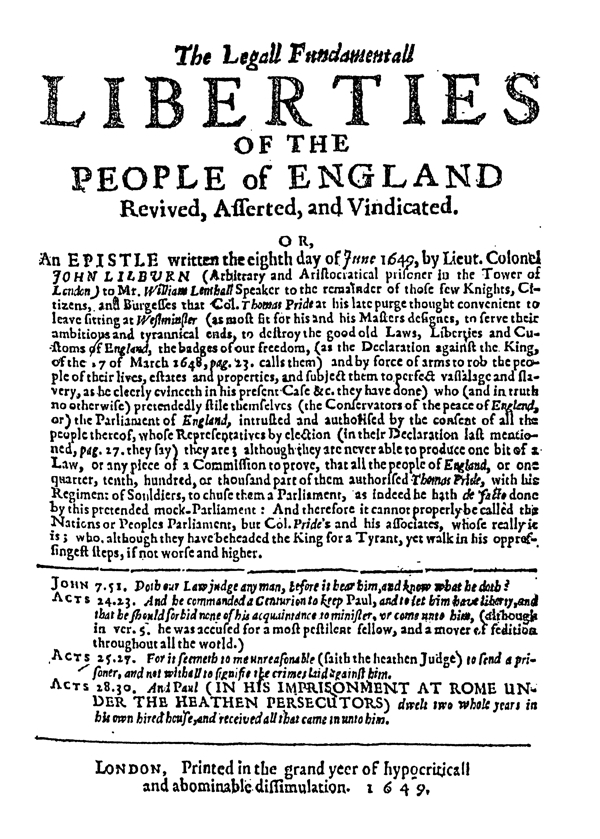
Title
John Lilburne, The Legall Fundamentall Liberties of the People of England Revived, Asserted, and Vindicated. Or, An Epistle written the eighth day of June 1649, by lieut. Colonel John Lilburn (Arbitrary and Aristocratical prisoner in the Tower of London) to Mr. William Lenthall Speaker to the remainder of those few knights, Citizens, and burgesses that Col. Thomas Pride at his late purge thought convenient to leave sitting at Westminster (as most fit for his and his Masters designes, to serve their ambitious and tyrannical ends, to destroy the good old Laws, Liberties and Customs of England, the badges of our freedom (as the Declaration against the King, of the 17 of March 1648, pag. 23. calls them) and by force of arms to rob the people of their lives, estates and properties, and subject them to perfect vassalage and slavery, as he cleerly evinceth in his present Case etc. they have done) who (and in truth no other-wise) pretendedly stile themselves (the Conservators of the peace of England, or) the Parliament of England, intrusted and authorised by the consent of all the people thereof, whose Representatives by election (in the Declaration last mentioned, pag. 27. they say) they are; although they are never able to produce one bit of a Law, or any piece of a Commission to prove, that all the people of England, or one quarter, tenth, hundred, or thousand part of them authorised Thomas pride, with his Regiment of Souldiers, to chuse them a Parliament, as indeed he hath de facto done by this pretended mock Parliament: And therefore it cannot properly be called the Nations or Peoples Parliament, but Col Pride’s and his associates, whose really it is; who, although they have beheaded the King for a Tyrant, yet walk in his oppressingest steps, if not worse and higher.
John 7. 51. Doth our Law judge any man, before it hear him and know what he doth? Acts 24. 23. And he commanded a Centurion to keep Paul and to let him have liberty, and that he should forbid none of his acquaintance to minister, or come unto him, (although in ver. 5. he was accused for a most pestilent fellow, and a mover of sedition throughout all the world.) Acts 25. 27. For it seemeth to me unreasonable (saith the heathen Judge) to send a prisoner, and not withall to signifie the crimes laid against him. Acts 28. 30. And Paul (in his imprisonment at Rome under the heathen persecutors) dwelt two whole years in his own hired house, and received all that came in unto him.
London, Printed in the grand yeer of hypocriticall and abominable dissimulation. 1649.
- vol. 6 1st ed. no image, corrected
- vol. 6 2nd ed. with image, corrected
Comments on the Image
The title page is a standard Leveller design. It is a good example of the prominent place given to the word “Liberties” in the title. Note the rather angry and somewhat despairing place of publication: “Printed in the grand yeer of hypocriticall and abominable dissimulation.”
T.206 (9.44) Richard Overton, A New Bull-Bayting: or, A Match Play’d at the Town-Bull of Ely (7 August, 1647)
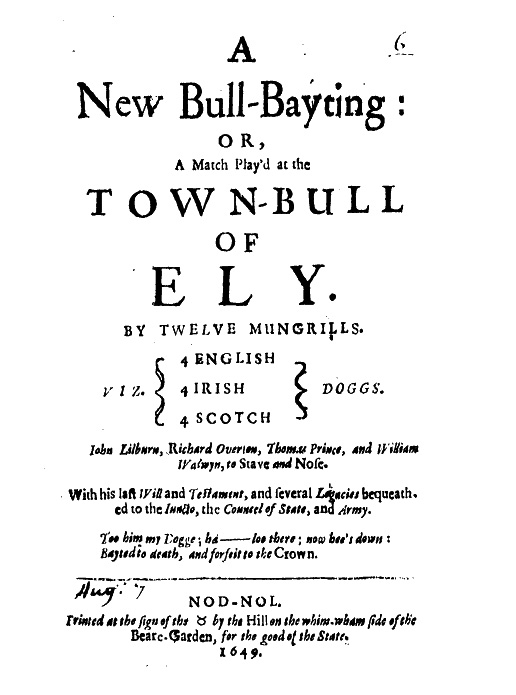
Title
Richard Overton, A New Bull-Bayting: or, A Match Play’d at the Town-Bull of Ely. BY TWELVE MUNGRILLS. VIZ. 4 ENGLISH 4 IRISH 4 SCOTCH DOGGS. Iohn Lilburn, Richard Overton, Thomas Prince, and William Walwyn, to Stave and Nose. With his last Will and Testament, and several Legacies bequeathed to the Iuncto, the Councel of State, and Army.
Too him my Dogge; ha—loo there; now hee’s down: Bayted to death, and forfeit to the Crown.
NOD-NOL. Printed at the sign of the by the Hill on the whim-wham side of the Beare-Garden, for the good of the State. 1649.
Comments on the Image
This is another example of the Levellers use of animal imagery in their pamphlets - in this case bull baiting (similar to bear baiting where an animal is tied to a stake and set upon by dogs while spectators watch and lay bets on the outcome). The bull to be baited is “Noll” (alias Cromwell) who has “gored” the nation with his reckless behaviour as General. Four Levellers (Overton, Lilburn, Prince, and Walwyn) are the “Bear-wards” who ensure a good fight by the dogs (mastiffs). The bull fights off the English and Scottish dogs until he is undone by the Irish dogs and is forced to write his last will and testament before dying. Overton then writes Noll’s (Cromwell’s) epitaph:
Here lies (the Devil take his Soul) One, for whom no Bell would towl: He liv’d a Murderer, dy’d a Knave; Deserv’d a Halter, not a Grave. Some call’d him Noll, some the Town-bull, Or Iron-sides, that the Land fill’d full Of Athiests, Shismaitcks, and Hereticks, That Ruin’d Kingdoms; undid Bishopricks, Despis’d his God, kill’d his King, broke th' Laws, Eate up our labours with devouring jawes; Cozen’d the People, spoyl’d all the Land; Had Lives and Goods at his Command.
You that Make· water, pray now stay, Piss on his Grave, and go away. That they that purge, may for his grace Un-truss, and S— upon his face.
T.218 (7.2) Mary Stiff, The good Womens Cryes against the Excise of all their Commodities (4 January 1650)
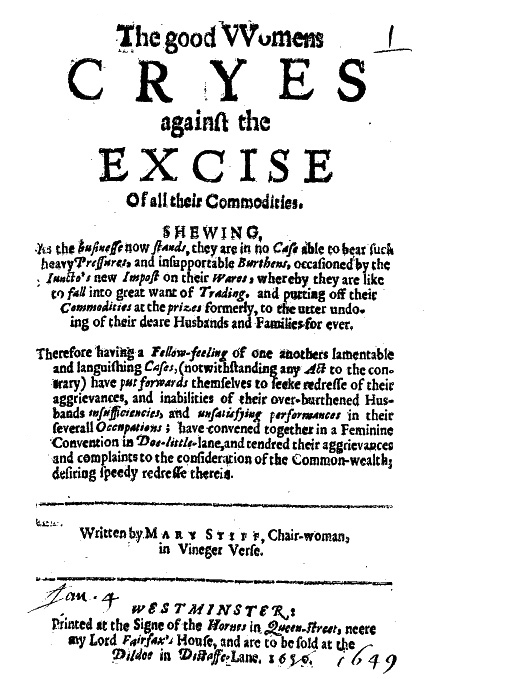
Title
Mary Stiff, The good VVomens Cryes against the Excise of all their Commodities. Shewing, as the businesse now stands, they are in no Case able to bear such heavy Pressures, and insupportable Burthens, occasioned by the Iuncto’s new Impost on their Wares, whereby they are like to fall into great want of Trading, and putting off their Commodities at the prizes formerly, to the utter undoing of their deare Husbands and Families for ever. Therefore having a Fellow-feeling of one anothers lamentable and languishing Cases, (notwithstanding any Act to the contrary) have put forwards themselves to seeke redresse of their aggrievances, and inabilities of their over-burthened Husbands insufficiencies, and unsatisfying performances in their severall Occupations; have convened together in a Feminine Convention in Doe-little-lane, and tendred their aggrievances and complaints to the consideration of the Common-wealth; desiring speedy redresse therein. Written by Mary Stiff, Chair-woman, in Vineger Verse.
Westminster. Printed at the Signe of the Hornes in Queen-street, neere my Lord Fairfax’s House, and are to be sold at the Dildoe in Distaffe-Lane, 1650.
Comments on the Image
This is a simple title page which is distinguished by the fact that it was written by a working woman and is clearly a “cry” against high taxes on the goods they buy and sell.
T.235 (7.17) Anon., The Vindication of Christmas (22 December, 1652)
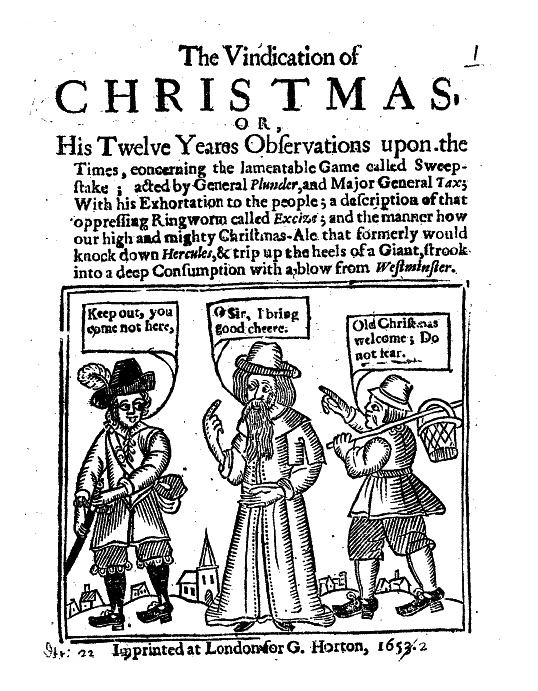
Title
Anon., The Vindication of Christmas, or His Twelve Yeares Observations upon the Times, concerning the lamentable Game called Sweepstake; acted by General Plunder, and Major General tax; With his Exhortation to the people; a description of that oppressing Ringworm called Excise; and the manner how our high and might Christmas-Ale that formerly would knock down Hercules, & trip up the heels of a Giant, strook deep Consumption with a blow from Westminster.
Imprinted at London for G. Horton, 1653.
Comments on the Image
This is another tract in favour of the people’s right to celebrate Christmas with drink and games and family activities. The title page has an amusing woodblock cartoon showing a swording bearing Puritan on the left challenging Father Christmas in the center, who is being defended by an ordinary working person on the right. Among the many things the author objects to are the new taxes imposed by “General Plunder” and “Major General Tax” on things like Christmas Ale.
T.227 (7.18) Benjamin Worsley, Free Ports (1652)
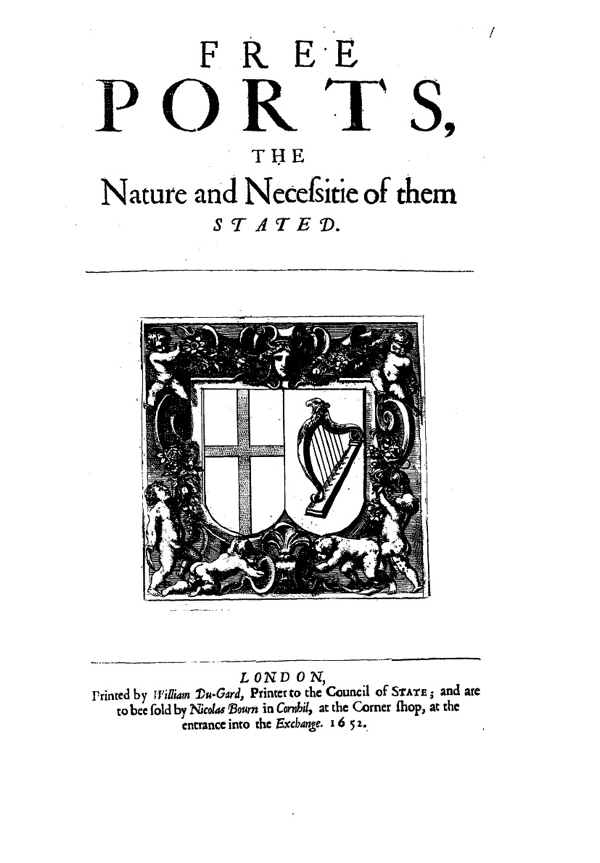
Title
Benjamin Worsley, Free Ports, the Nature and Necessitie of them stated.
London, Printed by William Du-Gard, Printer to the Council of State; and are to bee sold by Nicholas Bourn in Cornhil, at the Corner shop, at the entrance into the Exchange. 1652.
Comments on the Image
This is one of the few professionally produced pamphlets in the collection. The title page illustration looks professionally done and has classical symbols that would appeal to a more literate readership. It is a defense of free trade and the right of major ports to be open to international trade.